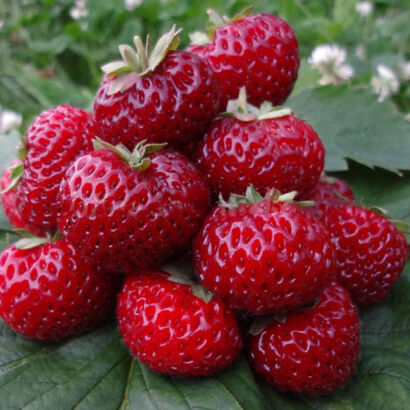Strawberry seedlings Mitse Schindler and top dressing for strawberries
Recommended for this product:
 Organo-mineral complex for berries
Organo-mineral complex for berries
Species: non-repairable, late ripening
Fruits: dense, sweet, cherry-colored, medium size, 10-20 gr.
Fruiting: July
Yield: average 0.8-1 kg/m².
Life cycle: perennial
Breeding: Germany
| Shipping and pickup: | |
| Ripening period | Late-ripening variety |
| fruit size | Traditional varieties |
| Productivity: | Medium |
| Selection | Germany |
| planting material | Strawberry |
Strawberry/garden strawberry variety Frau Mieze Schindler was bred in Germany from two popular varieties Luciida perfecta and Johann Moller in the 30s of the XX century.
Mitze Schindler belongs to the varieties of late ripening. It is characterized by increased drought and frost resistance.
Strawberry bushes are low, with small sparse leaves and moderately tall peduncles.
Medium-sized fruits: the weight of the first berries – 10-20 gr., subsequent – 5-10 gr. The color of the berries is dark red, saturated. Form – flattened-rounded. Pulp – light raspberry, soft. The taste of strawberries is special: sweet, with a raspberry flavor. Harvest up to 1 kg per square meter.
Most often, strawberries of this variety are consumed fresh. It is less suitable for canning and freezing
Gardeners love the Mitze Schindler variety. for unpretentiousness. It grows well and bears fruit in almost any soil, resistant to diseases. For planting strawberries choose a sunny place, loose and moisture-intensive soil.
It is not recommended to plant strawberries on clay, calcareous and sandy soils, as well as in dense soil.
Strawberries love moisture. Mitze Schindler can be watered manually, but it responds better to a sprinkler or drip irrigation.
Berries are best picked as soon as they ripen. Do not overexpose this variety on the bush, as overripe strawberries will become soft and disappear.
In the northern regions of the Russian Federation, strawberries must be covered for the winter. Replant to a new place every 4-5 years. With proper care, this will increase yields and reduce the likelihood of disease.
Preparations
| Phase | Operation | Biopreparations | Comment |
|---|---|---|---|
| Pre-plant tillage | Disease treatment | SBT-Trichodermin TH82 | Fight against overwintering forms of pathogens 30-100 g/20 l of water per 1 weave |
| Pest control | SBT-Pecilomycin RM116 | wireworms. Soil pest control: larvae and adults of the May beetle, wireworm, mole cricket, etc. 100-150 g / 1 weave is applied by spreading |
|
| top dressing | Organic fertilizer "TOR" | Main application in April Proportion 1:20 |
|
| SBT-Ekosoil | Stimulation of biological activity 50 g per 20 l of water / 1 weave |
||
| root formation | Disease treatment | SBT-Fitolek BS26 | Soaking the roots of seedlings Prevention of the development of a wide range of fungal diseases 60 g/10 l for 50 pcs. seedlings |
| SBT-Trichodermin TH82 | Prevention of the development of a wide range of fungal diseases. Soaking the roots of seedlings 60 g/10 l for 50 pcs |
||
| vegetation | Disease treatment | SBT-Fitolek BS26 | Prevention of powdery mildew, alternariosis, anthracnose, phomopsis, gray mold, curliness, septoria, tubercularia 40 g/10 l per 100 m2 |
| SBT-Trichodermin TH82 | Prevention of the development of root rot Treatment in the phase of bud break 60-80 g per 1 weave, with a total water consumption of 30 - 50 l / per 1 weave |
||
| Pest control | SBT-Entolek | Aphid. Pest control mites, weevil, aphids, flower beetles, moths, moths, leafworms. Treatment during bud break 60–80 ml/10 l of water per 100 m2 |
|
| top dressing | YaraTera Calcinit / Calcinitis | Use of fertilizers by fertigation 3rd week of vegetation - 15 kg/ha per week 5th week of vegetation - 15 kg/ha per week |
|
| SBT-Ekosoil | Stimulation of the development of the root system. improved provision of plants with nutrients 80–100 g per 1 hectare With a total water consumption of 30–50 l/1 hectare |
||
| Bloom | Disease treatment | SBT-Fitolek BS26 | Processing in the budding phase Prevention of powdery mildew, alternariosis, anthracnose, fomopsis, gray mold, curliness, septoria, tuberculariasis 40 g / 10 l per 1 weave |
| SBT-Trichodermin TH82 | Prevention of late blight, powdery mildew, root rot, gray mold, leaf spot 40 g/10 l per 100 m2 |
||
| top dressing | SBT-Biocomplex Amino | Stimulation of plant growth. Improvement of photosynthetic activity 20–30 ml/10 l per 1 hectare |
|
| YaraTera Calcinit / Calcinitis | Use of fertilizers by fertigation 3rd week of flowering - 15 kg/ha per week |
||
| Fruiting | Disease treatment | SBT-Fitolek BS26 | Prevention of late blight, powdery mildew, root rot, gray rot, leaf spot. During the ripening of berries (1-2 treatments) at intervals of 7-10 days 40 g / 10 l per 1 weave After picking berries 40 g / 10 l per 1 hundred square meters |
| SBT-Trichodermin TH82 | During the ripening period of berries (1-2 treatments) at intervals of 7-10 days 40 g/10 l per 1 weave |
||
| Pest control | SBT-Entolek | Ticks. Mite control Treatment of plants during the ripening period of berries (1-2 treatments) at intervals of 7-10 days 80–100 ml / 10 l of water per 1 weave |
|
| top dressing | YaraTera Calcinit / Calcinitis | Use of fertilizers by fertigation beginning of harvest - 15 kg/ha per week 3rd week of harvest - 15 kg/ha per week |
|
| After harvest | Disease treatment | SBT-Trichodermin TH82 | Autumn processing Reducing the stock of overwintering forms of pathogens spraying 120 g per 10–15 liters per 1 weave |
Recommended products











